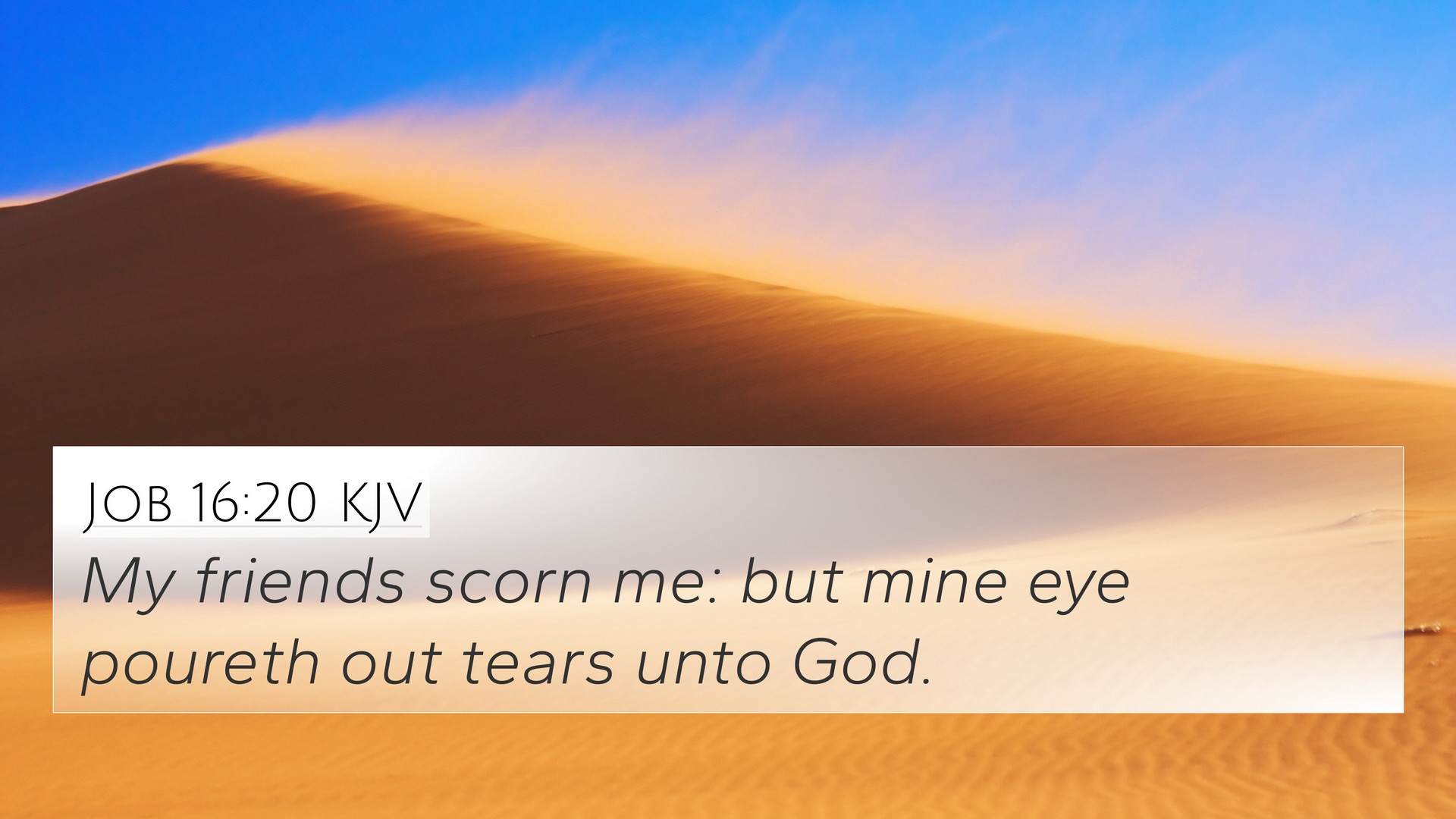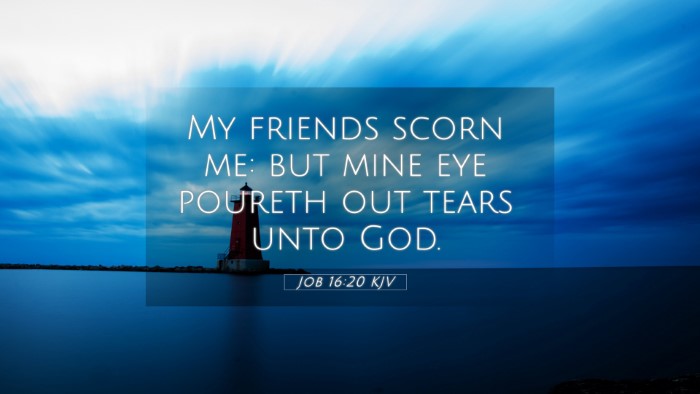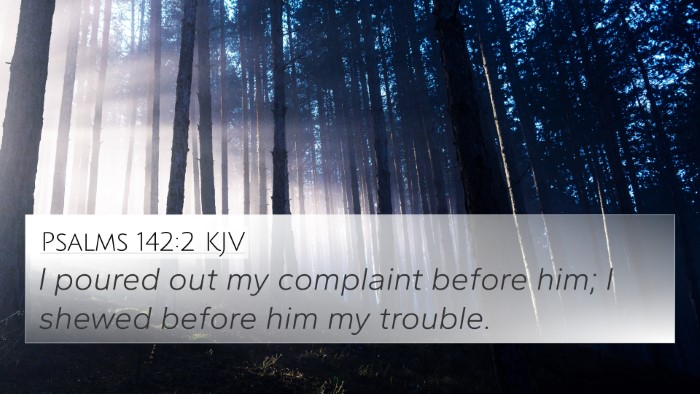Old Testament
Genesis Exodus Leviticus Numbers Deuteronomy Joshua Judges Ruth 1 Samuel 2 Samuel 1 Kings 2 Kings 1 Chronicles 2 Chronicles Ezra Nehemiah Esther Job Psalms Proverbs Ecclesiastes Song of Solomon Isaiah Jeremiah Lamentations Ezekiel Daniel Hosea Joel Amos Obadiah Jonah Micah Nahum Habakkuk Zephaniah Haggai Zechariah MalachiJob 16:20 Similar Verses
Job 16:20 Cross References
My friends scorn me: but mine eye poureth out tears unto God.
Uncover the Rich Themes and Topics of This Bible Verse
Listed below are the Bible themes associated with Job 16:20. We invite you to explore each theme to gain deeper insights into the Scriptures.
Job 16:20 Cross Reference Verses
This section features a detailed cross-reference designed to enrich your understanding of the Scriptures. Below, you will find carefully selected verses that echo the themes and teachings related to Job 16:20 KJV. Click on any image to explore detailed analyses of related Bible verses and uncover deeper theological insights.
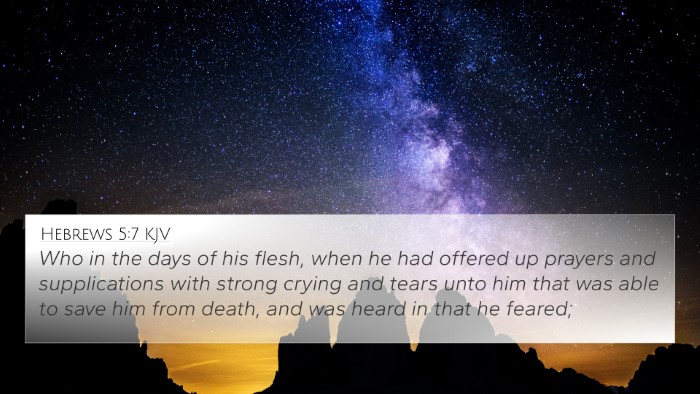
Hebrews 5:7 (KJV) »
Who in the days of his flesh, when he had offered up prayers and supplications with strong crying and tears unto him that was able to save him from death, and was heard in that he feared;

Job 16:4 (KJV) »
I also could speak as ye do: if your soul were in my soul's stead, I could heap up words against you, and shake mine head at you.
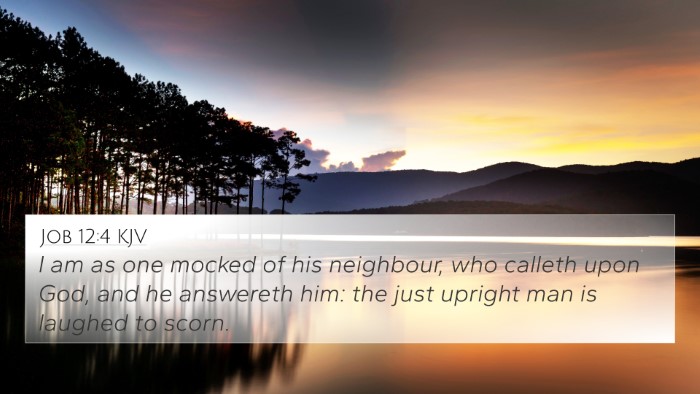
Job 12:4 (KJV) »
I am as one mocked of his neighbour, who calleth upon God, and he answereth him: the just upright man is laughed to scorn.
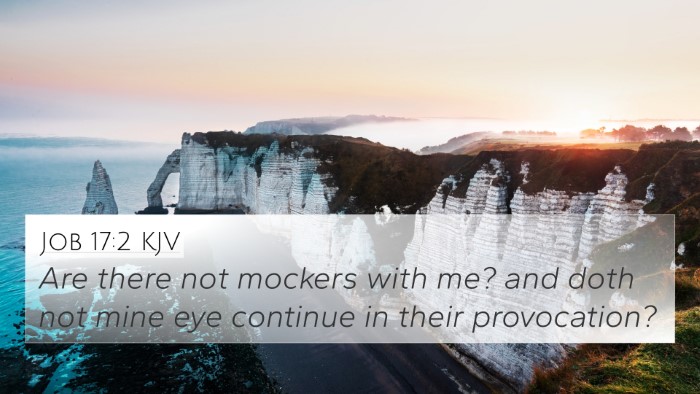
Job 17:2 (KJV) »
Are there not mockers with me? and doth not mine eye continue in their provocation?

Hosea 12:4 (KJV) »
Yea, he had power over the angel, and prevailed: he wept, and made supplication unto him: he found him in Bethel, and there he spake with us;
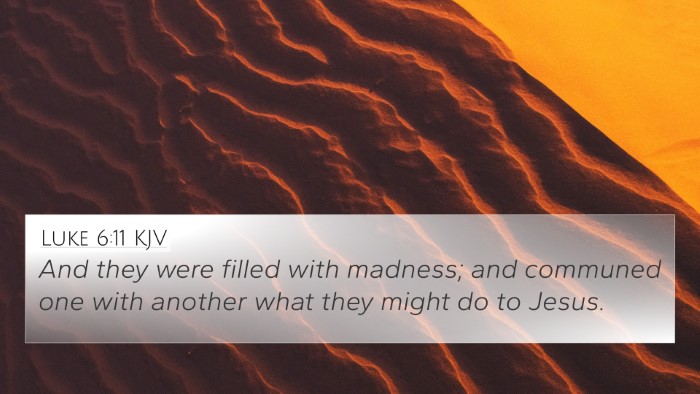
Luke 6:11 (KJV) »
And they were filled with madness; and communed one with another what they might do to Jesus.
Job 16:20 Verse Analysis and Similar Verses
Understanding Job 16:20
Job 16:20 states: "My intercessor is my friend as my eyes pour out tears to God; on behalf of a man he pleads with God as one pleads for a friend."
Summary of Job 16:20 Meaning
This verse reveals the deep emotional turmoil and longing for divine intervention that Job experiences amidst his suffering. He speaks of an intercessor, a friend who advocates for him before God. The imagery of pouring out tears demonstrates his sincerity and grief, as well as the human desire for support and understanding during challenging times.
- Job's Suffering: Job expresses the profound agony he feels due to his circumstances, highlighting the need for someone to stand in his defense.
- The Role of an Intercessor: This verse emphasizes the importance of intercession - having someone who can plead on one's behalf, a concept that resonates throughout the scriptures.
- Human Friendships: There is an implication of the significance of human relationships in times of distress, as Job sees this intercessor not just as a mediator but as a friend.
Insights from Public Domain Commentaries
Matthew Henry's Commentary: Henry explains that Job’s cry for an intercessor reflects his understanding of the need for mediation between man and God, recognizing the vast chasm that sin creates. His plea highlights the hope in finding someone to empathize with his plight and present it before God.
Albert Barnes' Notes: Barnes focuses on the term "friend," illustrating that Job is expressing a deep, personal relationship with this intercessor. This relationship underscores a fundamental human need for connection, particularly during suffering. Barnes also points out that the concept of an advocate is central to understanding the relationship between humans and the Divine.
Adam Clarke's Commentary: Clarke interprets Job's expressions of sorrow and longing for an intercessor as an anticipatory reference to Christ as the ultimate mediator. He connects Job’s thoughts to the New Testament, where Christ is described as our advocate before the Father.
Cross References
Job 16:20 resonates with several other scriptures that highlight themes of intercession, friendship, and human suffering. Below are 10 Bible verse cross-references related to Job 16:20:
- 1 Timothy 2:5: “For there is one God, and one mediator between God and men, the man Christ Jesus.”
- Hebrews 7:25: “Therefore he is able to save completely those who come to God through him, because he always lives to intercede for them.”
- Romans 8:34: “Who is he that condemns? Christ Jesus, who died—more than that, who was raised to life—is at the right hand of God and is also interceding for us.”
- Job 33:23-24: “If there is an angel on his side as a mediator, one out of a thousand, to tell a man what is right for him... ‘Spare him from going down to the pit; I have found a ransom for him.’”
- Luke 22:32: “But I have prayed for you, Simon, that your faith may not fail...”
- Psalm 139:2: “You know when I sit and when I rise; you perceive my thoughts from afar.”
- John 15:15: “I no longer call you servants, because a servant does not know his master's business. Instead, I have called you friends...”
- Proverbs 17:17: “A friend loves at all times, and a brother is born for a time of adversity.”
- Galatians 6:2: “Carry each other’s burdens, and in this way you will fulfill the law of Christ.”
- Romans 12:15: “Rejoice with those who rejoice; mourn with those who mourn.”
Thematic Connections
Job 16:20 serves to bridge numerous biblical themes that relate to human suffering, divine mediation, and the nature of friendship in times of trial. The following points highlight some thematic Bible verse connections:
- Prayer and Intercession: The necessity of having someone to pray and intercede just as Job sought emphasizes the importance of communal prayer as illustrated in various parts of Scripture.
- Endurance in Suffering: Job’s lament echoes with the teachings from James 1:2-4 regarding the joy found in trials and the perfecting of faith.
- Friendship Under Trial: Job seeks companionship in suffering, which aligns with the biblical portrayal of friends, such as David and Jonathan, forged in adversity.
Conclusion
Job 16:20 invites readers to consider the depths of human suffering, the need for an intercessor, and the profound connections that exist between biblical texts. The rich tapestry woven throughout scripture concerning themes of intercession, suffering, and friendship amplifies the message of hope amidst despair. Understanding these connections can enhance one’s study of the Bible and foster a deeper engagement with its teachings. The practice of cross-referencing biblical texts is not only a tool for exploring scripture but a means to discover the interconnectedness of God’s word.
